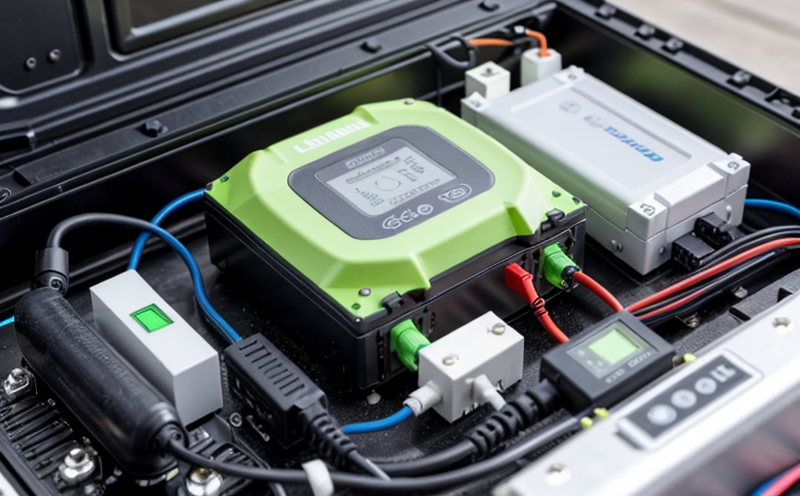IEEE 1188 Lithium-Ion Battery Testing for VRLA Replacement Systems
The IEEE standard 1188-2005 provides a comprehensive framework for testing lithium-ion batteries intended to replace valve-regulated lead-acid (VRLA) batteries in various applications. This service ensures that the new battery systems meet stringent performance and safety requirements, thereby enhancing reliability and reducing maintenance costs.
Lithium-ion batteries are increasingly favored due to their higher energy density compared to VRLAs. However, the transition from traditional lead-acid technology to lithium-ion requires rigorous testing to ensure compatibility with existing infrastructure and operational protocols. The IEEE 1188 standard specifically addresses this need by offering a standardized approach to evaluate the performance of lithium-ion batteries in a range of conditions.
The testing process involves several critical stages, each designed to assess different aspects of the battery's performance:
- Electrochemical Characterization: This step evaluates the electrochemical properties of the battery under various discharge rates and temperatures. It helps determine the maximum power output and energy efficiency of the lithium-ion battery.
- Cycling Stability: Lithium-ion batteries are subjected to multiple charge-discharge cycles to assess their ability to maintain consistent performance over time. This is crucial for ensuring longevity and reliability in applications where continuous operation is essential.
- Temperature Resistance: Testing at different ambient temperatures helps identify the battery's thermal stability, which is critical for preventing overheating and potential safety hazards.
- Impedance Analysis: Impedance testing provides insights into the internal resistance of the battery. This information is vital for predicting the battery's health and diagnosing any issues that may arise during operation.
The results of these tests are meticulously documented, allowing stakeholders to make informed decisions regarding the suitability of lithium-ion batteries as VRLA replacements. The comprehensive nature of IEEE 1188 ensures that all relevant factors are considered, providing a robust foundation for reliable performance in demanding environments.
Our laboratory adheres strictly to the guidelines set forth by IEEE 1188, ensuring accurate and consistent results across all tests conducted. This commitment to precision is reflected in our state-of-the-art facilities and experienced technical staff who possess deep knowledge of battery technology and testing methodologies.
The success of this service lies not only in meeting the stringent requirements outlined in IEEE 1188 but also in providing actionable insights that can guide further development and optimization of lithium-ion batteries. By leveraging this standard, our clients gain a competitive edge through enhanced product reliability and compliance with industry best practices.
Industry Applications
The IEEE 1188-2005 standard is applicable across various industries where the transition from VRLA to lithium-ion batteries is taking place. This includes:
- Data Centers: Ensuring uninterrupted power supply and efficient energy management.
- Telecommunications: Supporting robust network infrastructure with reliable backup power solutions.
- Renewable Energy: Facilitating the integration of solar and wind farms through stable and efficient battery storage systems.
- Automotive: Enhancing vehicle performance by optimizing the use of lithium-ion batteries in hybrid and electric vehicles.
In each of these sectors, the reliability and safety of the battery system are paramount. IEEE 1188 provides the necessary framework to ensure that lithium-ion batteries meet the stringent requirements set by industry standards. This not only enhances operational efficiency but also contributes significantly to the overall sustainability of the systems.
International Acceptance and Recognition
The IEEE 1188-2005 standard has gained widespread acceptance and recognition across the globe, particularly in regions where the transition from VRLA batteries to lithium-ion is a priority. Countries like the United States, Europe, and Asia have embraced this standard as it offers a harmonized approach to testing that aligns with international best practices.
One of the key benefits of adhering to IEEE 1188 is the assurance of interoperability between different systems. This ensures that lithium-ion batteries can seamlessly integrate into existing infrastructure without requiring extensive modifications or additional costs. The standard also promotes consistency in test procedures, which is crucial for maintaining high-quality standards across diverse geographical locations.
The adoption of IEEE 1188 has led to improved reliability and safety in battery systems, which is increasingly important as reliance on lithium-ion batteries continues to grow. By following this standard, manufacturers can demonstrate compliance with global regulations and industry expectations, thereby enhancing their reputation and market positioning.
Environmental and Sustainability Contributions
The transition from VRLA to lithium-ion batteries offers significant environmental benefits. Lithium-ion batteries have a lower carbon footprint compared to lead-acid batteries due to reduced mining requirements and improved efficiency in energy storage. Additionally, the lifecycle of lithium-ion batteries is longer, leading to less frequent replacements and ultimately reducing waste.
Compliance with IEEE 1188 ensures that lithium-ion batteries are designed and tested to minimize environmental impact. This includes optimizing battery chemistry and manufacturing processes to reduce resource consumption and emissions. By adhering to this standard, manufacturers can contribute positively to environmental conservation efforts while meeting the growing demand for sustainable technologies.
The standard also promotes recycling initiatives, which play a crucial role in the circular economy. Proper recycling of lithium-ion batteries reduces the need for raw material extraction and helps recover valuable materials for reuse. This not only supports sustainability but also ensures that the industry remains responsible stewards of natural resources.





